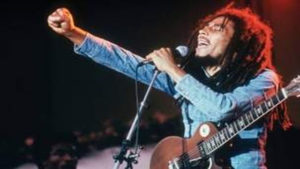 WHEN Martijn Huisman decided to write a book about Bob Marley And The Wailers, his objective was to show readers the legendary band’s global impact “from the bottom of the Grand Canyon to the frozen heights of the Himalayas in Nepal”. He accomplished that with The Reggae Nation: The Global Legacy of Bob Marley & the Wailers.
WHEN Martijn Huisman decided to write a book about Bob Marley And The Wailers, his objective was to show readers the legendary band’s global impact “from the bottom of the Grand Canyon to the frozen heights of the Himalayas in Nepal”. He accomplished that with The Reggae Nation: The Global Legacy of Bob Marley & the Wailers.
Released September 23, the 432-page book sees the Dutch author going into major cities where Marley and his band introduced reggae, as well as remote areas where they did not perform but nevertheless have a following due to their charismatic leader’s timeless music.
Huisman told the Jamaica Observer that the expansive work — a limited amount of 500 copies are available — took him 10 years to complete.
“I started working on the project in late summer of 2011. Rather naively, I expected at the time that I would be spending a couple of months on it. But, as I consulted numerous sources of information and talked to many knowledgeable people, the months turned into years and the scope of The Reggae Nation kept expanding,” he said. “I have spent countless hours on the project, really a lot of my free time, throughout the years. But, it was all more than worth it as my passion for and devotion to the music and culture kept me going. The music kept the fire burning and the book progressing, slowly but surely,” Huisman added.
One of the book’s eye-openers is how Marley’s music appealed to indigenous people. Huisman focuses on groups in Australia, New Zealand, the Pacific and United States.
He also looked at the reggae king’s role in historic events such as the birth of Zimbabwe, the fall of the Berlin Wall and riots in Tiananmen Square.
To mark Zimbabwe’s independence, Marley and The Wailers performed at the event in Harare in April 1980. Protestors at the Berlin Wall in Germany and Tiananmen Square in China 32 years ago, challenged the status quo to his music.
“Native American tribes in the United States, Māori in New Zealand, Aboriginals in Australia, the indigenous people of West Papua, native ethnic groups in China… They and others saw (and see) Marley as a musical freedom fighter and found in reggae inspiration, solace, solidarity, support, and strength to continue and empower their struggles for dignity, freedom, justice, self-determination and (cultural) survival,” said Huisman.
He added that,“Reggae appealed to them as a potent and compelling expression of social and political resistance as well as cultural awakening. In the book, we witness how Bob Marley’s music was part of the birth of a nation (Zimbabwe), was played and sung by the people at remarkable historic events (the fall of the Berlin Wall, the Tiananmen Square protests, the Contra War in Nicaragua, the Arab Spring), supported and amplified the voices of protest which called for the end to apartheid in South Africa, played a role in the political events of nations (Jamaica, Ivory Coast, Kenya, to give but a few examples), and contributed to youth movements and protests across Europe.”
Huisman, who is from the city of Rotterdam, studied journalism at Erasmus University in his hometown. He began listening to reggae when he was 10 years old.
Eleven years ago while at Erasmus, Huisman did an extensive feature titled Babylon by Bus, based on Marley and The Wailers’ groundbreaking tour of the Netherlands in 1976. Those shows were part of the 1977 album of the same name distributed by Island Records.
